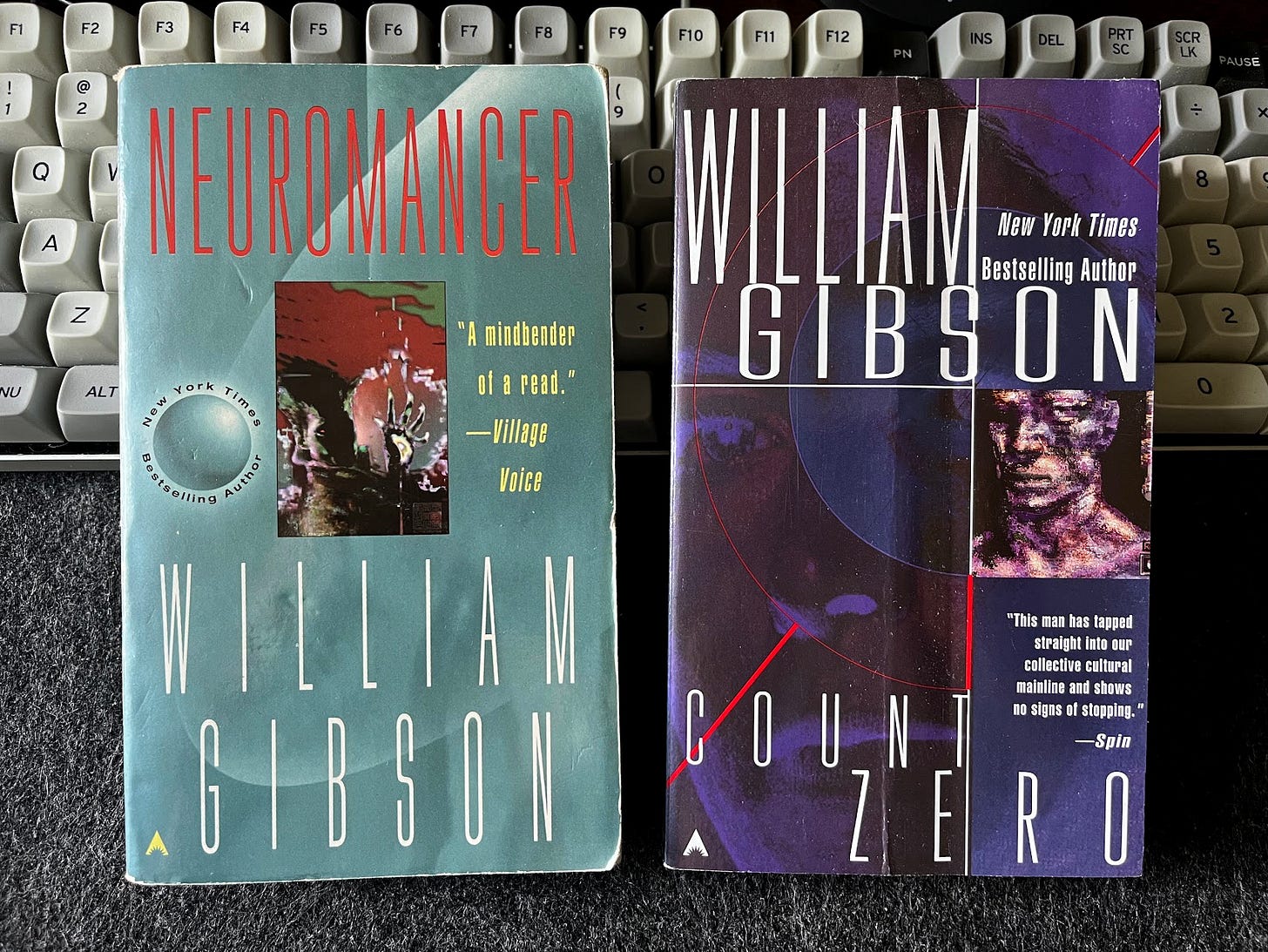Worldbuilding & Etymology

By now, everyone is familiar with the concept of “cyberspace,” thanks in part to William Gibson’s Neuromancer. But when Gibson first coined the word, he never stopped to define it. He didn’t explain the physics or write an appendix on how his networks operated. He dropped readers headfirst into a world of console cowboys, artificial intelligences, and multinational cartels, and trusted them to catch up.
Neuromancer is one of my favorite novels of all time. And it’s not because the book is encyclopedic or overloaded with detail. Its world feels immense precisely because Gibson refuses to explain everything. Characters like Case and Molly, groups like the Tessier-Ashpool clan, and places like Freeside or the Sprawl are sketched in bold strokes, but never fully mapped. Readers get fragments of slang, glimpses of architecture, hints of history. The rest is left to the imagination.
Nowhere is this clearer than in one of my favorite place names in all of fiction: Villa Straylight. The words drip with implication. It is part fortress, part ancestral palace, part decaying labyrinth. Gibson doesn’t hand his readers blueprints or dynastic charts. The name alone conjures eccentricity and mystery. The world grows larger in the space between what’s said and what’s only suggested.
And that’s the point. The gaps don’t work because Neuromancer is set in “our future,” making it easier to imagine. They work because Gibson sparks the imagination. That spark is the engine of immersion.
The same principle applies to fantasy. Too much detail is not only unnecessary, but it can weigh a story down. Fantasy and science fiction don’t differ from contemporary fiction and thrillers because their worlds are “less known.” Our own world is already massive and mysterious. No one person has mapped every inch of it. And yet novels set here are compelling… not because the geography is explained to us, but because the characters are.
That’s what we can borrow from reality for fantasy and sci-fi: the power of the unknown. A good story leaves gaps. Not plot holes… but deliberate spaces where wonder takes root.
When the world grows beyond the page, so too will the reader’s imagination with it.
🌋 Worldbuilding is the Servant, Not the Master
Maps are wonderful things. They can orient and overwhelm at the same time. But a good map is drawn for a purpose.
Worldbuilding is the same way. Its purpose is to serve the story. The most intricate fictional culture, the most painstakingly documented political system, and the most detailed machinery of magic will not matter if the story isn’t compelling. A reader is here for the journey. The scaffolding should be invisible… or at least translucent.
This is easy to forget in genres like fantasy and science fiction, where worldbuilding can become a competitive sport. It’s tempting to start with lore, timelines, languages, and dynasties. But plenty of great stories get along without any of that.
Contemporary fiction, romance, and thrillers all happen in our own world. A world already massive, mysterious, and largely unknown. We read those stories not because every corner of the Earth is catalogued, but because the characters are compelling within the great, unmapped expanse of real life.
If that’s enough to keep us turning pages here, maybe your fictional world doesn’t need an appendix the size of a phone book. And, I would argue, it shouldn’t have one.
🥀 The Liability of Over-Explaining
There’s a certain type of chapter that sinks otherwise fine novels: the exposition dump. It often begins with “It was said that…” or “Long ago, in the time of…” and proceeds to ladle out pages of lukewarm broth with all the appeal of history homework.
These sections tend to feel obligatory rather than electric. The author may think, “I have to explain this or the reader won’t understand.” If that’s the case, then the story lacks human drama… and if it’s not the case, then explaining it all up front robs readers of the sense of discovery they hope to feel turning page after page.
Hints are far more powerful than infodumps. A hint invites the reader to lean forward, an infodump pushes them back. A cellar door refusing to open is the beginning of a compelling story… the minutes of the meeting where its square footage was approved is not.
Characters keep us reading. Mystery keeps us up past bedtime. Explanation keeps us checking the page count.

🪞 Etymology is a Portal
Nowhere is the art of suggestion more potent than in naming things. A name can open a door to another world faster than a paragraph of description.
It’s quiet worldbuilding. In the real world, place names and surnames carry centuries of change… rivers older than nations, borrowed words wandering through languages, professions fossilized in family names. We may never think about these links, but we feel them.
Fiction works the same way. A city called “Blackfen” feels older and stranger than “Dark Marsh City” because it sounds like something shaped by real tongues over time. A character named “Calder” hints at streams and stones without needing explanation.
A good name whispers that there’s more to know. It doesn’t need an origin story, only the suggestion of one. That hint draws readers into a world that feels deeper than the page, where every name might have yet another story behind it.
🌳 Borrowing from Reality
If you’ve ever read a name in a fantasy novel and thought, “That sounds real,” it’s probably because it is… or at least, it’s wearing the clothing of something real. Historical linguistics is a treasure trove for worldbuilders. Old Norse, Ancient Greek, Sanskrit, Latin… these languages carry with them echoes of whole civilizations. When you borrow from them thoughtfully, you borrow their gravity.
This doesn’t mean you have to create a fully functioning language. There’s a spectrum. On one end, you have the simplest possible names: “The Tower,” “The Temple.” These can work if they’re meant to feel universal or archetypal. On the other, you have Tolkien’s high-investment naming… words with centuries of fictional history. Most of us live in the middle: we want the flavor, the suggestion of a history, without the decades of linguistic homework.
Drawing from real-world etymology also keeps your invented names from feeling like random syllables strung together. It helps them belong. Even a slight nod to real language can give the reader the sense that this is just one piece of a much bigger puzzle.
📈 Leave them Wanting More
This is the heart of it.
We think we want every detail, but the moment every detail is given, the mystery evaporates. Wonder thrives in the spaces between what is told and what is hinted.
A good name is like a locked door at the end of a hallway. You may never open it, but you’ll think about it for the rest of the book. A good story gives you glimpses… the name of an ancient battle, a reference to a half-forgotten king, a word from a language no one speaks anymore. These are threads the reader can choose to pull or leave dangling, but they create the sense of a tapestry too large to see all at once.
Hints make the world seem big. Explanations make it seem small. This doesn’t mean you should never explain anything… only that you should explain less than you’re tempted to. Let your reader’s imagination do some of the work. They’ll thank you for it, even if they don’t realize why.
🚪 Closing the Door (But Not All the Way)
If I’ve done my job right, the worlds I write will feel like they exist beyond the page. You won’t see every river on the map, but you might glimpse one in the distance. You won’t know every etymological root, but you’ll sense the weight of history behind the names. You won’t get a full lecture on ancient wars, but you’ll hear the echoes of them in a tavern song.
This is the kind of worldbuilding I love as a reader, and the kind I try to create as a writer. Not a showcase of exhaustive research. Not a self-contained encyclopedia. Just enough scaffolding to hold the story… and just enough mystery to keep you leaning forward.
The door to the cellar is locked. But if you press your ear to it, you might hear something moving inside.
🔌 Shameless Plug
Valen the Rogue and the Starlit Scepter is now available on Amazon as an eBook and in paperback. To begin at the beginning, Valen the Rogue and the Domain of Darkness is also available as an eBook and in paperback.

